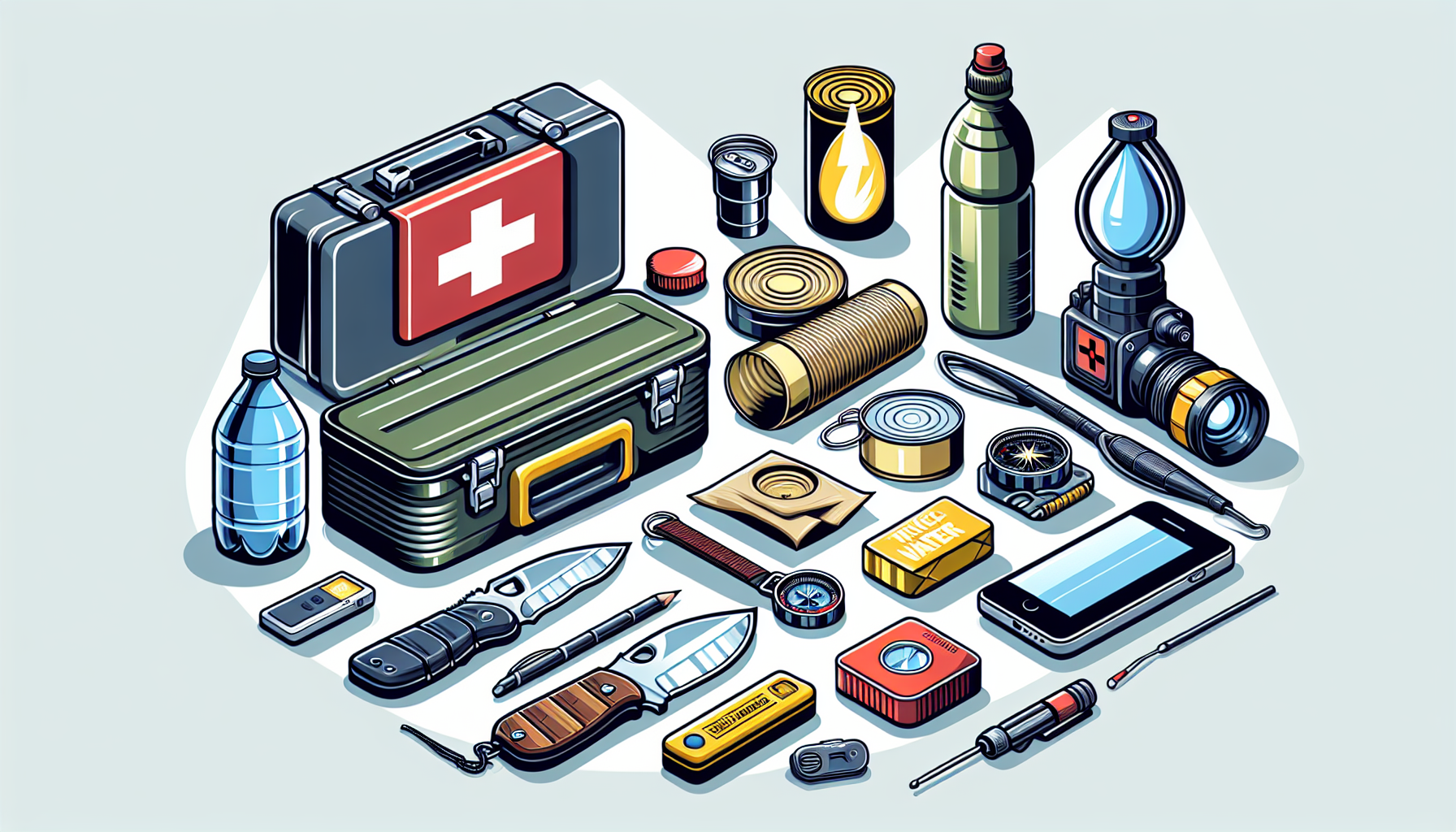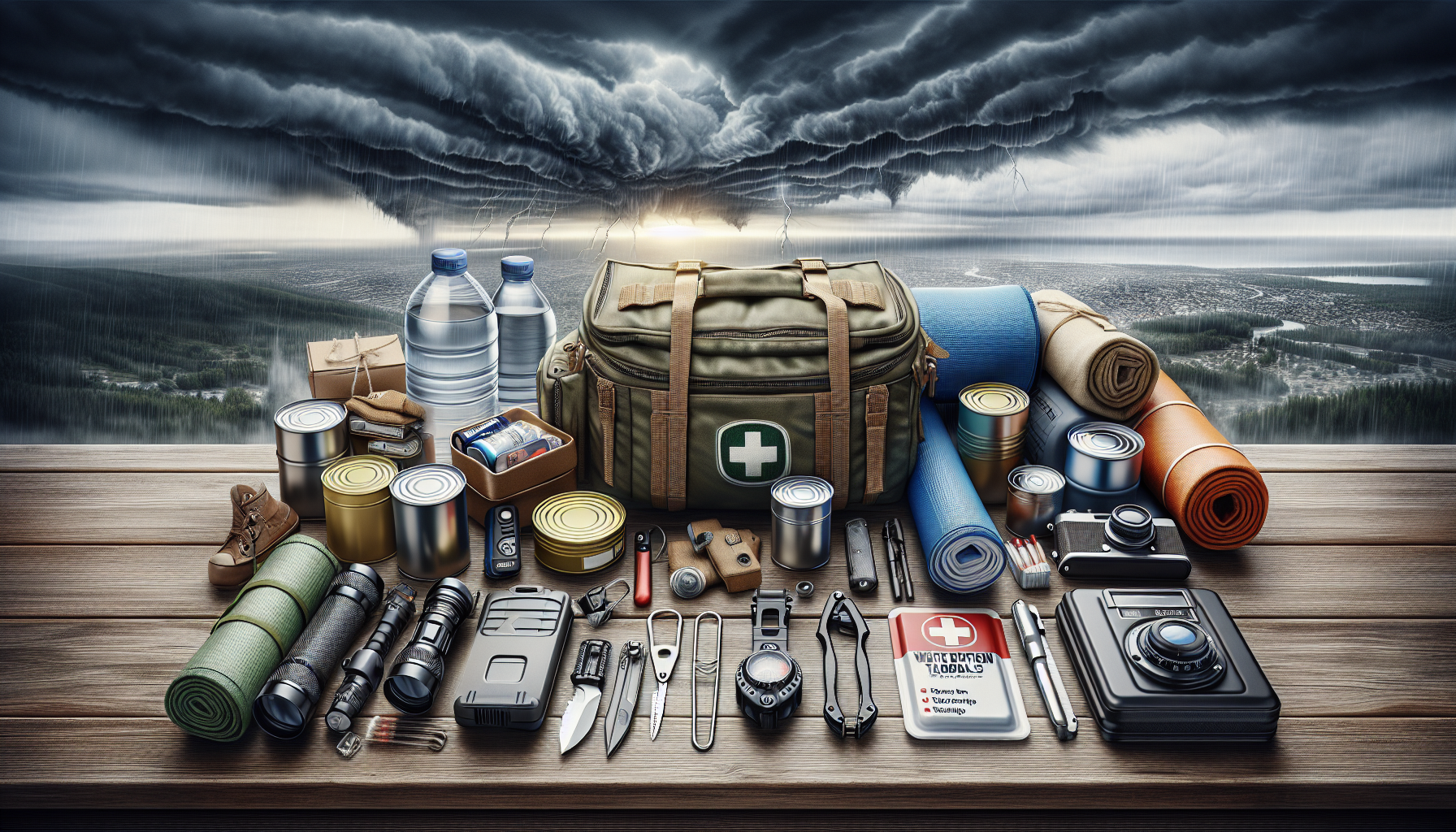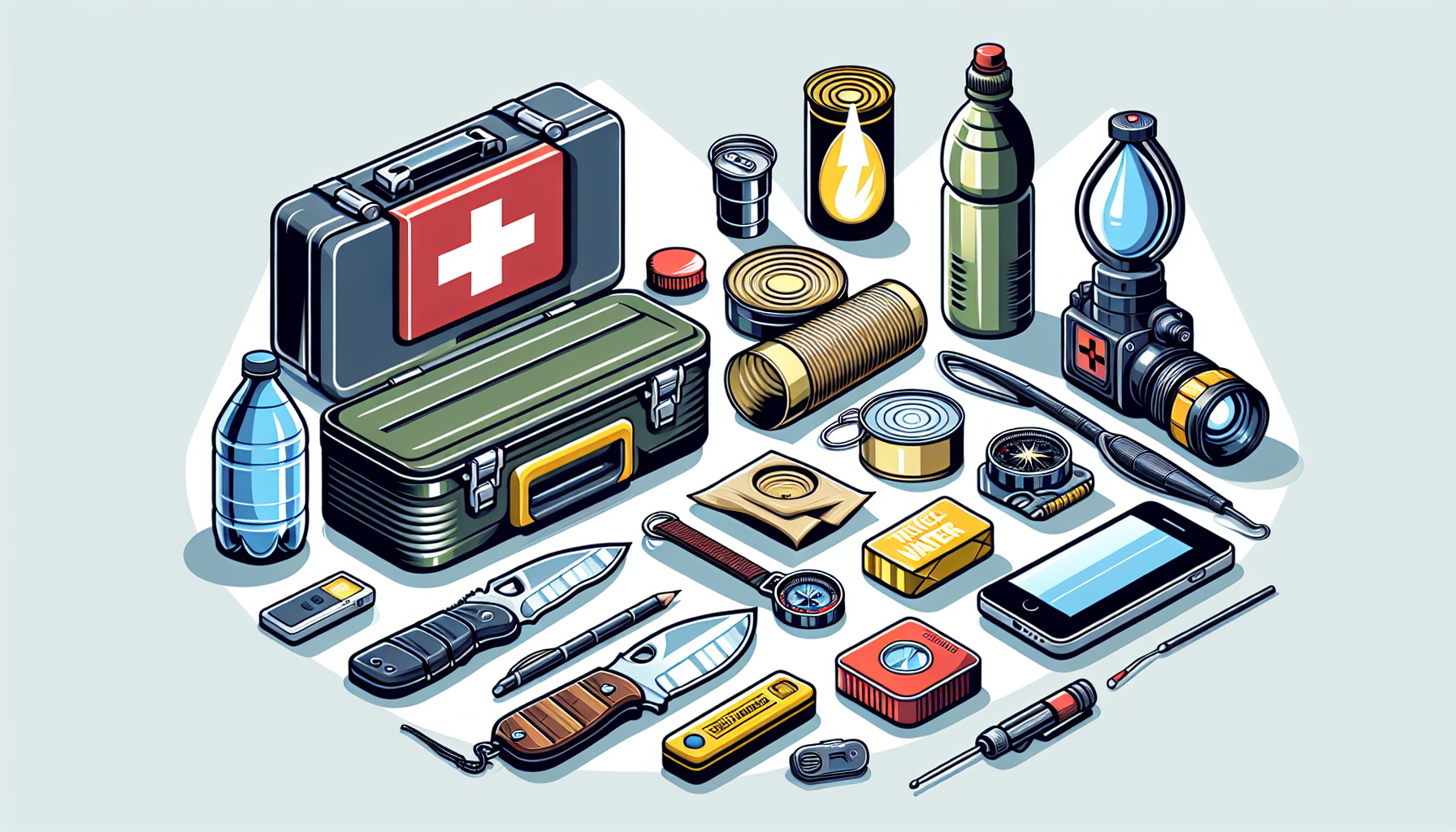Imagine a world without the modern comforts we’ve become so reliant on – electricity, clean water, and readily available food. Now picture yourself being prepared for anything that could disrupt these conveniences. In a time of uncertainty, being a prepper gives you peace of mind, knowing you have all the essentials to survive and thrive. Whether it’s a natural disaster or a societal collapse, being well-equipped is crucial. So, what are the must-haves for every prepper? From food storage and water purification to self-defense tools and communication devices, this article will guide you through the essentials that every prepper needs to have in their arsenal.
Food and Water
Non-perishable food items
When preparing for emergencies or disasters, it is crucial to have a supply of non-perishable food items. These are food items that have a long shelf life and do not require refrigeration. Stocking up on canned goods, dried fruits, nuts, and granola bars ensures that you have enough sustenance to last you through any period of isolation or limited access to fresh food. Aim for a variety of foods to ensure a balanced diet.
Water storage and purification methods
Water is essential for survival, and it is crucial to have an adequate supply in case of emergencies. Start by storing at least one gallon of water per person per day for a minimum of three days. Consider investing in water purification methods such as water filters or purification tablets to ensure you have access to clean drinking water when necessary. It is essential to regularly check and rotate your water supply to maintain its freshness.
Cooking and heating devices
In times of emergency, having reliable cooking and heating devices is essential. Portable camping stoves or propane-powered cooking devices can be a lifeline when electric or gas-powered stoves are unavailable. Additionally, having alternative heating options such as warmers or portable heaters can provide much-needed warmth during colder months. Always ensure that you have a sufficient supply of fuel or batteries to operate these devices.
Shelter and Clothing
Tents or temporary shelters
Having a sturdy and reliable shelter is crucial during emergencies or disasters. Tents or temporary shelters provide protection from the elements and offer a sense of security. Look for tents that are easy to set up, durable, and can accommodate the number of people in your household. Consider having additional tarps or emergency blankets on hand to provide extra insulation or create makeshift shelters if needed.
Sleeping bags
Investing in quality sleeping bags is essential for ensuring a good night’s rest during emergencies. Sleeping bags should be rated appropriately for the expected temperature range, keeping in mind that conditions can quickly change. Look for sleeping bags that are lightweight, waterproof, and provide adequate insulation.
Warm clothing and blankets
Staying warm is vital for your well-being during emergencies. Make sure to pack extra warm clothing such as jackets, thermal layers, hats, and gloves for each family member. Additionally, having extra blankets or sleeping bag liners can provide added insulation and comfort during colder nights.

Emergency Communication
Two-way radios
When traditional communication methods fail, two-way radios can facilitate communication among family members or members of a group. These devices allow you to communicate over short distances, even without cellular service or electricity. Make sure to choose radios with a long-range and a sturdy build for durability.
Cell phone with solar charger
Your cell phone can be a lifeline during emergencies, providing access to emergency services and vital information. However, it is essential to have a reliable power source to keep your phone charged. Consider investing in a solar charger that operates via sunlight or a hand crank charger for backup power.
Emergency whistle
An emergency whistle is a simple yet effective tool for attracting attention during emergencies. It can be used to signal for help or alert others to your presence. Keep a whistle on hand and ensure that every family member knows how to use it properly.
First Aid and Medications
Comprehensive first aid kit
Having a comprehensive first aid kit is essential to address any injuries or medical needs during emergencies. Make sure your kit includes bandages, gauze, adhesive tape, antiseptic wipes, pain relievers, scissors, tweezers, and any necessary prescription medications. Familiarize yourself with the contents of the kit and ensure that everyone in your household knows how to use them.
Prescription medications
If you or any family members require prescription medications, make sure to have an ample supply on hand. Consider rotating these medications regularly to ensure they remain within their expiration dates. Keep a record of dosage instructions and any necessary information for each medication.
Over-the-counter medications
In addition to prescription medications, it is essential to have over-the-counter medications on hand to address common ailments or minor injuries. Pain relievers, antacids, cold and flu medications, and antihistamines are some examples of medications that can come in handy during emergencies.

Multiple Light Sources
Flashlights and extra batteries
Having reliable light sources is essential during emergencies, especially when power outages occur. Flashlights, along with extra batteries, should be readily accessible in multiple locations throughout your home. Opt for LED flashlights, which provide bright light and are energy-efficient.
Glow sticks
Glow sticks provide a long-lasting and portable source of light during emergencies. They are an excellent alternative to flashlights when you need hands-free lighting or want to mark a specific area. Keep a supply of glow sticks in your emergency kit.
Headlamps
Headlamps are another valuable lighting option, offering hands-free illumination. They are particularly useful when performing tasks that require both hands, such as cooking or setting up a tent. Ensure that you have enough headlamps for each family member.
Self-defense Tools
Firearms and ammunition
For those who are comfortable and trained in the use of firearms, they can be an additional tool for self-defense during emergencies. If you choose to include firearms in your emergency preparedness plan, ensure that you follow all relevant laws, receive proper training, and store them safely in a secure location separate from ammunition.
Pepper spray
Pepper spray is a non-lethal self-defense option that can incapacitate an assailant temporarily. It is a compact and easily accessible tool that can provide peace of mind during emergencies. Make sure to familiarize yourself with local laws regarding the use and possession of pepper spray.
Personal alarms
Personal alarms emit a loud and attention-grabbing sound when activated. They are small and portable, making them easy to carry on your person. Personal alarms can deter potential attackers and attract attention in case of an emergency.
Hygiene and Sanitation
Toilet paper
Maintaining proper hygiene and sanitation is crucial during emergencies. Make sure to include an ample supply of toilet paper in your emergency kit. Choose toilet paper that is lightweight, easily portable, and biodegradable.
Hand sanitizer
Hand sanitizer is an essential item to include in your emergency supplies, providing a quick and convenient way to clean your hands when water and soap are not readily available. Look for hand sanitizers with at least 60% alcohol content for effective disinfection.
Feminine hygiene products
If you or any female family members require feminine hygiene products, be sure to include a sufficient supply in your emergency kit. Opt for products that are individually wrapped or sealed to maintain their freshness and cleanliness.
Tools and Equipment
Multi-tool
A multi-tool is an all-in-one device that combines several tools into a compact and portable package. Look for a multi-tool that includes essential tools such as pliers, knives, screwdrivers, and can openers. It can be invaluable for various tasks during emergencies.
Duct tape
Duct tape is a versatile and durable adhesive that can be used for various purposes during emergencies. It can be used for repairs, securing items, or creating makeshift solutions. Keep a roll of duct tape in your emergency kit for any unexpected situations.
Camping stove
A camping stove is a reliable and portable cooking device that can be used during emergencies when traditional methods are unavailable. Look for a stove that is easy to set up and operate, providing an efficient heat source for cooking meals and boiling water.
Emergency Cash and Documents
Emergency cash in small bills
Having emergency cash in small bills is essential during emergencies when electronic payment methods may not be available. Keep a stash of cash in your emergency kit, ensuring you have enough to cover basic expenses for a certain period.
Copies of important documents
Make copies of important documents such as identification cards, passports, insurance policies, and property deeds. Keep these copies in a waterproof and portable container as they may be needed for identification or verification purposes during emergencies.
Contact list
Maintain an updated contact list of essential emergency contacts, including local authorities, emergency services, family members, and friends. This list should be readily accessible to ensure you can reach out for help or provide updates to loved ones during emergencies.
Survival Manuals and References
Books on survival skills
Investing in books or manuals on survival skills can provide valuable knowledge and guidance during emergencies. Topics such as first aid, wilderness survival, and basic navigation can equip you with the necessary skills to handle various situations effectively.
Maps and compasses
Having maps and compasses is crucial for navigation during emergencies, especially in areas with limited or no GPS signal. Familiarize yourself with local maps and ensure you have a reliable compass that can guide you to safety if needed.
Emergency contact information
Compile a list of emergency contact information, including important phone numbers, addresses, and email addresses. This information should include local authorities, emergency services, hospitals, and key contacts that can provide assistance or support during emergencies.
By preparing and having these essential items readily available, you can ensure the well-being and safety of yourself and your loved ones during emergencies. Remember to regularly review and update your emergency supplies to maintain their effectiveness. Stay informed, stay prepared, and be ready to face any challenge that comes your way.
